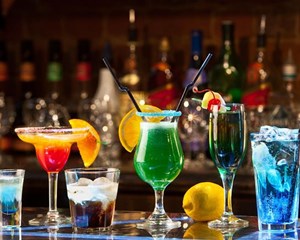The epochal significance of the Super Cube should not be overlooked in an industry in which meaningful innovation has typically been considered close to impossible. As the explosion in bottled water brands in the past few decades has shown, it is possible to persuade consumers of the need to buy something that they could quite easily obtain for themselves out of a tap. But ice's main job is to be cold – in most applications, a distinctive taste would be a flaw – and so The Ice Co has had to work harder than any water brand to diversify.
在一個有意義的創新通常被認為近乎不可能的行業中,超級立方體的劃時代意義不應被忽視。正如過去幾十年瓶裝水品牌的爆炸式增長所表明的那樣,說服消費者購買他們可以很容易從水龍頭里獲得的東西是有可能的。但冰的主要工作是降溫——獨特的口味在大多數應用中會是一個缺陷——因此The Ice Co必須比任何水品牌都要更加努力地實現多樣化。
Pressure from retailers to come up with the next big thing in ice is constant. Within The Ice Co this has resulted in some ideas perhaps best left at the bar. There were ice shot glasses (the product of a Jagerbomb-fuelled brainstorming session; "very, very gimmicky", admitted Metcalfe). There was the Ice & Easy brand of slushie cocktails – margaritas, mojitos, daiquiris, pina coladas – that arrived in a ready-to-pour freezer pouch. There were Ice & Slice mixed bags of ice and sliced lemon or lime ("launched too early", admitted Woolhouse). There has even been talk of glitter-infused ice, and iced baubles – although, at the time of writing, neither of those has made it past the product development triage process.
零售商們不斷施加壓力,要求他們推出一款新的冰產品。至此The Ice Co內部涌現了一些比較適合應用于酒吧的創意。有冰酒杯(野格炸彈式頭腦風暴會議的產物,梅特卡夫承認“非常、非常有噱頭”)。還有Ice & Easy品牌的冰沙雞尾酒——瑪格麗塔酒、莫吉托、代基里酒、皮尼亞科拉達——裝在冷藏袋里。還有Ice & Slice混合袋裝的冰塊和切片檸檬或青檸(伍爾豪斯承認“推出得太早了”)。甚至還有人談論加入有閃光元素的冰塊和用冰做的小玩意兒——盡管在撰寫本文時它們都還沒有通過產品開發的篩選過程。

Whatever The Ice Co is selling, there remains the tricky question of how to sell it. In the US, the approach to marketing packaged ice revolves around a single idea: fear. Visit the International Packaged Ice Association's website today and the same slogan blares out from the homepage header as it has for years: "ICE IS FOOD!" This central marketing message, that ice is a "forgotten food", as susceptible to contaminants as meat or fresh vegetables, communicates the one clear advantage of packaged ice: the manufacturer's control over the conditions in which it is made.
無論The Ice Co賣的是什么,如何銷售仍是一個棘手的問題。在美國,推銷包裝冰的方法只有一個理念:恐懼。今天訪問國際包裝冰協會的網站,你會發現多年來其首頁的標題從未改變:“冰是食物!”冰是一種“被遺忘的食物”,像肉類和新鮮蔬菜一樣容易受到污染物的影響,這一核心營銷信息傳達了包裝冰的一個明顯優勢:制造商對生產條件的控制。
The Ice Co's strategy has been different. The product in question is undeniably cold – temperatures in The Ice Co's factory hover around 4-5°C, and in cold storage they plummet to -20°C – but ice is not without its warmer associations. Ice means weddings and parties and festivals or even something as simple but delightful as that first drink at the end of a long day. In Woolhouse's words: "It's not just frozen water, you're not buying ice – you're buying that occasion. That's what you're buying into – what would a party be without ice?"
The Ice Co的營銷策略則有所不同。不可否認,該產品是冷的——Ice Co工廠的溫度在4-5度左右徘徊,而在冷藏庫中則驟降至零下20攝氏度——但冰并非沒有溫暖的聯想。冰的意思是婚禮、派對、節日,甚至是一些像漫長一天結束后的第一杯飲料這樣簡單但令人愉快的事情。用伍爾豪斯的話說:“這不僅僅是冰凍的水,你不是在買冰,你買的是那個場合。這才是你買的東西——聚會怎能沒有冰塊呢?”
As heartwarming as the sentiment may be, the Covid-19 pandemic has raised a different question: what would ice be without a party? What should have been a banner year for The Ice Co has instead forced it to refocus, and work out how best to plot a course through a new set of obstacles. A quirk of water is that it expands as it freezes, meaning that ice is capable of breaching even the most concerted attempts to confine it. Is 2020 the year that ice escapes The Ice Co's grasp?
盡管這種情緒可能是令人感動的,但新冠疫情引發了一個不同的問題:如果沒有聚會,冰產業會怎么樣?對The Ice Co來說今年本應是輝煌的一年,但它卻不得不重新聚焦并找出克服一系列新的障礙的最佳途徑。水的一個奇特之處在于它在結冰時會膨脹,這意味著冰能夠打破即便是最頑固的用來限制它的困難。2020年是否會是冰塊逃出“The Ice Co”掌控的一年呢?











